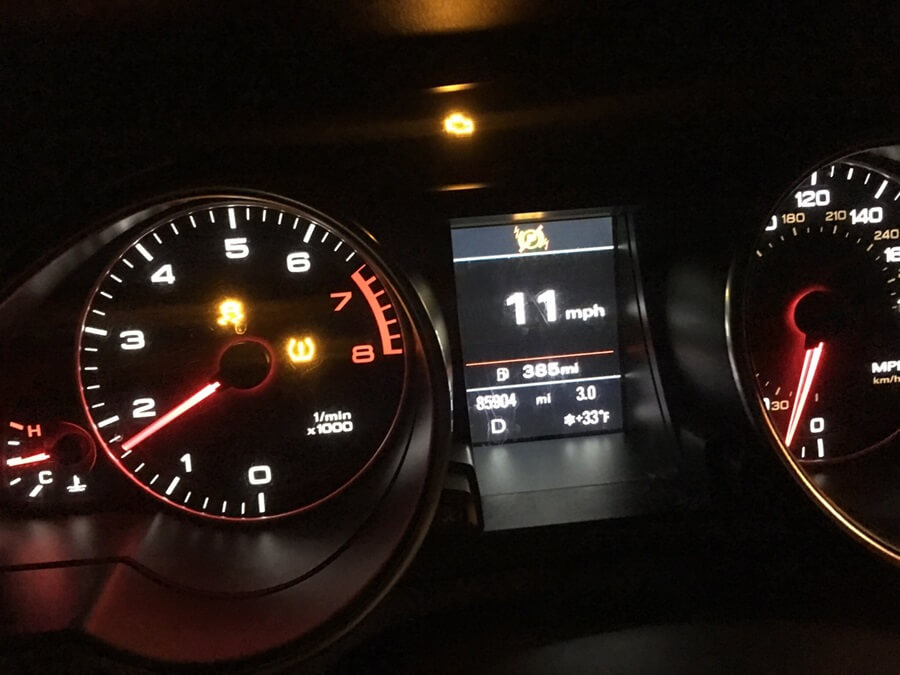Audi vehicles are renowned for their performance and luxury. Audi is known to manufacture reliable, well-built, and enjoyable-to-drive cars. Audi automobiles are renowned for their cutting-edge technologies and fashionable design. However, with extended use or neglect, Audi vehicles are not immune to issues.

Since they are luxury vehicles, repairs can be costly; but, if a problem is not resolved right once, it may result in further maintenance that is even more costly. As a result, you need to be aware that the parking brake malfunction is one of the most common problems that affect Audi owners. In this article, we will tell you the causes and solutions to solve this problem.
What Does an Audi Parking Brake Malfunction Mean?
Simply, this is a dashboard alert that indicates there is a problem with the parking brake system. This malfunction light appears when the vehicle’s electronic control unit (ECU) detects a problem during the brake test.
6 Main Causes Of Parking Brake Malfunction
Here are some of the causes due to which parking brake malfunction occurs:
1. Parking Sensor Malfunction
When the driver presses the parking button, the parking brake fails to apply if the parking sensors are malfunctioning. When the driver applies the brake, the parking brake might not be released. Regardless parking brake lights are activated or not, the car might still move or get stuck in the parking position.
2. ECU Malfunction
You have identified the issue if the parking brake mistake was caused by Audi’s electronic control unit (ECU). It is simple to perform your calibration of the ECU. Get a calibration file from the Audi website, then apply it while following the on-screen directions to calibrate the ECU.
3. Contaminated Brake Fluid
Brake fluid is exposed to contamination from dirt and other debris over time. The parking brake could fail as a result of this. Your Audi’s fluid needs to be replaced and cleansed if you think it may be contaminated.
4. Damaged Brake Pads
If the fluid level and quality have been checked and the parking brake is still not working correctly, it might be time to replace the parking brake pads.

As parking brake pads degrade over time, the parking brake may stop working if they become too thin. It will be necessary to replace the worn-out brakes on your car.
5. Parking Brake Cable Defect
It could be time to replace the parking brake cable if your parking brake is still not working properly. When you apply the parking brake, the pressure is applied to the brake pads by the parking brake cable. Over time, The cable could fail due to wear and tear or damage.
6. Issues with Batteries
All Audi cars have an electronic parking brake system that depends on electricity to work. Problems could arise if the battery is weak or dying since it might not have enough power to activate or deactivate the parking brake.

A weak or drained battery is one typical battery-related problem. The battery can lack enough power to activate or deactivate the parking brake, leading to failures, if it is low in voltage or not fully charged. This can be especially problematic during the winter months when the low temperatures may cause the battery to lose capacity.
Similar Posts:
Solutions to Audi Parking Brake Malfunction
Here are some of the solutions that you can use to solve this issue:
1. Verify that the Voltage is Appropriate
For the car to stop when it’s needed, the braking system needs to have the right amount of power. Increased or decreased voltage could indicate an issue related to the battery or the Electronic Control Unit (ECU). Because of this, the driver needs to check the voltage using the necessary diagnostic tools.
2. To Read Codes, Use A Compatible Scanner
The OBD-II port on your Audi is normally located near the driver’s side door, behind the steering wheel. A suitable scan tool can read any error codes that are placed on the PC. If there is a brake-related code, you could be able to figure it out and fix the problem.
3. Verify That Everything Is Clean
It is essential to regularly inspect the components of the electric parking brake. For example, because brake pads apply the force required to slow down a car, they are essential for stopping it.
4. Unplug and Plug the Battery Back in
If your parking brake isn’t functioning properly, then it’s crucial. This will reset all of the vehicle’s electronics, including the parking brake.
What Cars Have Electronic Parking Brakes?
Relatively new technology, the electronic parking brake (EPB), is already standard equipment on many Audi models. Since the early 2000s, the EPB has been a feature on several Audi models, and it is currently standard on the majority of new Audi cars.
Several well-known Audi models with an EPB are the A1, A2, A3, A4, A5, A6, A8, Q3, Q5, Q7, and TT. A tiny switch on the dash or center console operates the electronic parking brake mechanism on certain cars. Instead of depending on a conventional mechanical system, the EPB system applies and releases the brake with the help of electric motors.
How To Reset The Audi Electronic Parking Brake?
Follow these steps to reset the parking brake on your Audi:
- Apply the brakes.
- Change to Neutral
- Apply the parking brake once or twice.
- Pull it up two more times.
Conclusion
Electronic parking brakes on the Audi streamline and simplify the vehicle’s design. The electronic parking brake is a significant innovation, but drivers still have to deal with a lot of problems with it.


![[Fixed] Audi Parking Brake Malfunction: Meaning & Common Causes Audi Parking Brake Malfunction](https://carstale.com/wp-content/uploads/audi-parking-brake-malfunction-1024x457.jpg)